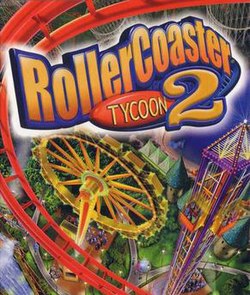RollerCoaster Tycoon 2
| RollerCoaster Tycoon 2 | |
|---|---|
 |
|
| Developer(s) |
Chris Sawyer Productions Frontier Developments (expansion packs) |
| Publisher(s) |
Infogrames Atari, Inc. (Time Twister expansion pack) |
| Designer(s) | Chris Sawyer |
| Programmer(s) | Chris Sawyer |
| Artist(s) | Simon Foster |
| Composer(s) | Allister Brimble |
| Series | RollerCoaster Tycoon |
| Platform(s) | Microsoft Windows |
| Release date(s) | |
| Genre(s) | Construction and management simulation |
| Mode(s) | Single-player |
| Aggregate scores | |
|---|---|
| Aggregator | Score |
| GameRankings | 76% |
| Metacritic | 74/100 |
| Review scores | |
| Publication | Score |
| Eurogamer | 6/10 |
| G4 | |
| Game Informer | 8.5/10 |
| Game Revolution | 7.5/10 |
| GameSpot | 7.0/10 |
| IGN | 8.4/10 |
| PC Gamer (US) | 80/100 |
RollerCoaster Tycoon 2 is a construction and management simulation computer game that simulates amusement park management. Developed by Chris Sawyer Productions and published by Infogrames, the game was released in October 2002 as the sequel to RollerCoaster Tycoon and the second game in the RollerCoaster Tycoon series. The features and expansions were later featured in the mobile game, RollerCoaster Tycoon Classic.
RollerCoaster Tycoon 2 tasks players with managing amusement parks in different scenarios with the goal of having them succeed in different ways. The game returns to isometric projection which debuted with the predecessor, allowing for a large degree of compatibility. Various attractions, including transport rides, gentle rides, thrill rides, roller coasters, water rides, and shops or stalls, can be added to the parks as well as landscaping and decorations. The player satisfies the needs of the visitors by building food stalls, drink stands, bathrooms, and souvenir shops as well as facilities and services, such as ATMs (known as "cash machines" in-game) and information kiosks. Players must balance their budget in their expenses and income while doing this.
One notable difference from RollerCoaster Tycoon is a more robust system for building structures, in which one can lay each piece of wall and roof individually. The game provides greater flexibility by allowing pieces of scenery, rides, and other structures to be placed at varying heights above and below ground. The mechanics in the predecessor made custom building construction less efficient, and rides and shops were previously unable to be built at varying elevations; in that game, only rides that had tracks could be built underground, since the first section of any ride had to be placed above ground. Many of the rides from the original RollerCoaster Tycoon have been modified and/or renamed, one example being "Scrambled Eggs" renaming to "Twist". Some old ride designs have been merged with others, such as the "The Wooden Twister Coaster" being included in the "The Wooden Roller Coaster".
...
Wikipedia
